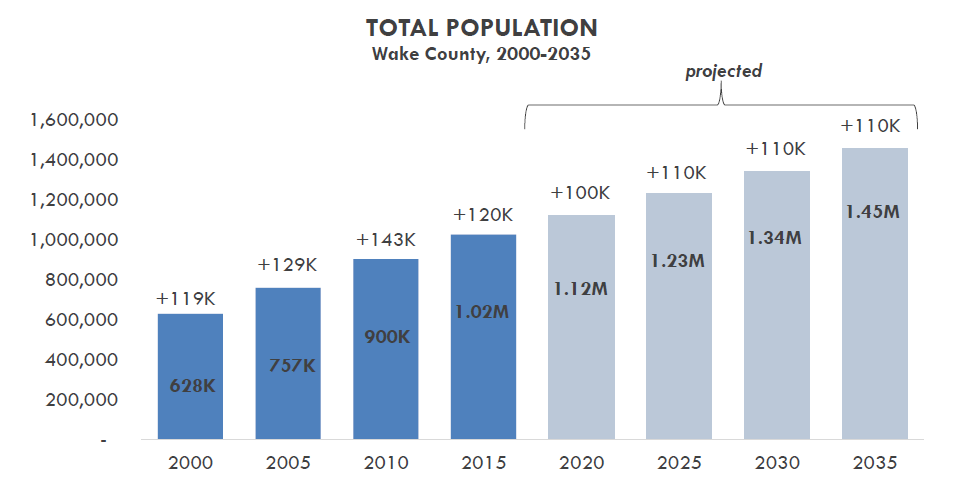To successfully achieve affordable housing for all Wake County residents, we need your support!
See the latest strategic plans to increase affordable housing below.
The Challenge
There are approximately 56,000 working households making less than $39,000 a year in Wake County currently unable to find affordable housing. Current trends show that number may increase to as many as 150,000 households over the next 20 years.
To address this growing need, the Wake County Board of Commissioners approved the 20-year Affordable Housing Plan in October 2017, developed by the Affordable Housing Steering Committee. While there is no single solution to the challenge, the plan includes several strategies to improve housing affordability in Wake County.
Wake County’s Department of Housing Affordability and Community Revitalization supports housing affordability strategies and homeless services that are not supported by the housing market – helping make our county more affordable to more people.
What is affordable housing?
Housing is considered affordable when families spend no more than 30% of their income on housing expenses.* Families who pay more than this for housing are considered cost burdened and may have difficulty affording other necessities. Affordable housing can be anywhere. It can be renter or owner occupied. It can be single-family, multi-family or anything in between. It must meet standards of being safe, decent and conforming to all building and safety codes.
*According to the US Department of Housing and Urban Development
Why is housing affordability a challenge in Wake County?
Nearly every city in the U.S. is having a hard time providing affordable housing for their residents. There are different reasons why, but also common themes across cities. The trends below are the main factors affecting affordable housing in Wake County specifically, many of which are also seen elsewhere in the country.

Rapid population growth is generating upward pressure on the cost of housing. Wake County will add approximately 430,000 more residents over the next 20 years, growing by an average of 22,000 people each year.

Household incomes are not keeping pace with escalating housing costs. Since 2006, the median household income for those without a bachelor’s degree has increased 10%, while rental housing costs have increased 35%.

Affordable housing development has not kept pace with demand or need. In 2015, 500 affordable housing units were produced, representing just 5% of the county’s total housing production.

There is a loss of naturally occurring and subsidized affordable housing developments. In 2015, Wake County experienced a net loss of approximately 300 units of affordable housing.

Unmet housing needs are growing rapidly. Today, 56,000 low-income households are unable to find affordable housing. Current trends show that number may increase to as many as 150,000 households over the next 20 years.
Why is housing affordability important?
Affordable housing is the foundation for personal and professional wellbeing. Unfortunately, a family with one full-time worker earning the minimum wage cannot afford the local fair-market rent for a two-bedroom apartment anywhere in the United States. Most in our community who find themselves homeless or cost-burdened by housing have been priced out by rising costs in the housing market.
Over the course of a year more than 5,000 individuals and families experience homelessness in Wake County. Wake County's high cost of living, especially housing expenses, makes a homeless person's transition to housing stability an often long and frustrating process. It also means that many people that make Wake County a great place to live – including educators, service workers, public safety employees, and others – have trouble finding homes in their community.
Exploring the Affordable Housing Crisis in Wake County
Strategies
While Wake County and its municipalities face a growing housing crisis, they have the opportunity to mitigate this situation by implementing recommended tools to more effectively address residents’ housing needs. The Wake County Affordable Housing Plan outlines three essential strategies to address Wake County’s growing housing crisis:
Land Use Policy
The county and its municipalities will use their land use regulations and zoning authorities to indirectly support the production and preservation of affordable housing. More intensive and flexible land use will better enable housing supplies to keep pace with housing needs. This strategy will also help to mitigate housing cost increases and reduce the pressure to convert existing affordable units to market-rate housing.
Leveraged Programs
New subsidized affordable housing will be created or preserved to meet residents’ needs. Structuring programs to effectively combine public funding with private and philanthropic capital will increase the total amount of affordable housing that can be produced or preserved.
New Public Resources
New funding sources for affordable housing production and preservation will be developed to increase the resources available to meet housing challenges. A dedicated public subsidy will help produce affordable housing that closes the gap between what a household can afford to pay and what it costs to develop and maintain quality housing
These strategies provide a roadmap to better address residents’ housing needs. By pursuing these tools, the county, along with its municipal partners, can increase the development of affordable housing while also protecting existing affordable housing.
How Can You Help?
To successfully achieve affordable housing for all Wake County citizens, we need your support! We want to hear from you! Email us at housing.info@wake.gov.
Take Action
Attend a Board of Commissioners meeting when a topic that interests you is on the agenda.
Spread the Word!
Share the affordable housing plan, fact sheets and updated from the Housing Department on social media! Follow us on @WakeGov on Twitter, Instagram, and Facebook for updates!

